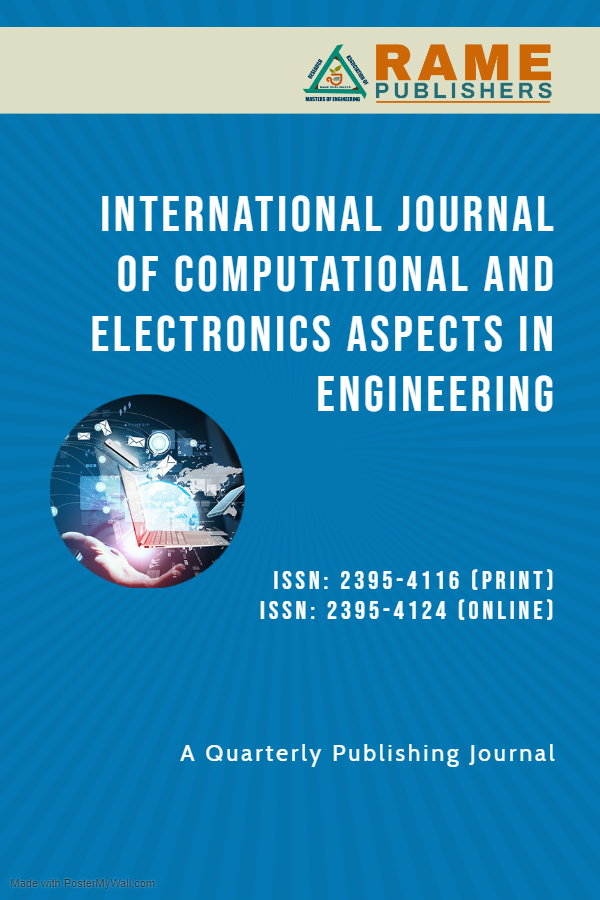Enhancing Cloud Security Through Artificial Intelligence: Detecting Advanced Cyber Attacks and Analyzing Anomalous Patterns
Mohammed Fareed Mahdi
International Journal of Computational and Electronic Aspects in Engineering
Volume 6: Issue 3, June 2025, pp 108-120
Author's Information
Mohammed Fareed Mahdi1
Corresponding Author
1Department of Computer Science, University of Thi-Qar, Iraq
mfmsprof@utq.edu.iq
Abstract:-
Cloud computing has proven to be a modern technical solution that provides a flexible and effective environment for data storage and processing. However, the rapid development of advanced cyber-attacks is an important threat to the protection of these systems, which reveals the immediate need for intelligent danger and prevention methods. The purpose of this research is to strengthen cloud safety by taking advantage of artificial intelligence techniques - especially deep learning and machine learning properly detect sophisticated cyber threats and analyze abnormal behavioral patterns. The suggested feature involves collecting and analyzing large data obtained from the cloud -event log, followed by classification and prophecy algorithm to identify suspicious activities in real time. Preliminary results suggest that the proposed model acquires high identification accuracy by reducing the false alarm, improving the general efficiency of cloud safety systems. These findings emphasize the important role of AI in developing a smart solution to shape modern cyber security strategies and to fight new dangers.Index Terms:-
Cybersecurity, Cloud Computing, Artificial Intelligence, Deep Learning, Pattern Analysis, Threat DetectionREFERENCES
- M. A. Khan, "A survey of security issues for cloud computing," Journal of Network and Computer Applications, vol.
78, pp. 11–29, 2017.
- S. Zissis and D. Lekkas, "Addressing cloud computing security issues," Future Generation Computer Systems, vol. 28,
no. 3, pp. 583–592, 2012.
- N. S. S. Raghava and B. K. Tripathy, "Cloud security mechanisms using machine learning: A review," IEEE Access, vol.
8, pp. 125345–125370, 2020.
- Y. Liu, J. Wang, and K. Sun, "Deep learning-based anomaly detection for cloud computing security," IEEE Transactions
on Cloud Computing, vol. 9, no. 2, pp. 697–709, 2021.
- J. Lin, W. Yu, and N. Zhang, "Security and privacy for the Internet of Things: A survey," IEEE Communications
Surveys & Tutorials, vol. 19, no. 2, pp. 1055–1076, 2017.
- X. Cheng, M. Nasajpour, and A. Al-Jumaily, "A comprehensive review on machine learning-based cyber attack detection
in cloud computing," Computers & Security, vol. 111, p. 102487, 2021.
- P. Wang, Y. Chen, and Z. Zhao, "Artificial intelligence for cybersecurity: A comprehensive review," IEEE
Transactions on Neural Networks and Learning Systems, vol. 32, no. 8, pp. 3455–3473, 2021.
- R. K. Lal, A. Sharma, and P. K. Gupta, "A novel AI-based approach for intrusion detection in cloud computing,"
Future Internet, vol. 13, no. 5, p. 127, 2021.
- L. Wu, X. Xu, and W. Wang, "Deep learning applications in cybersecurity: A review," IEEE Access, vol. 9, pp.
179185–179206, 2021.
- A. Patel, H. Patel, and J. A. Patel, "A review of hybrid approaches for intrusion detection in cloud computing,"
IEEE Access, vol. 9, pp. 144567–144580, 2021.
- R. Shams, S. Islam, and M. K. Hasan, "Deep learning-based anomaly detection in cloud networks," Journal of Cyber
Security Technology, vol. 5, no. 3, pp. 189–207, 2022.
- K. Kumar and S. Sharma, "A survey on AI-based cybersecurity solutions in cloud computing," Future Generation
Computer Systems, vol. 125, pp. 212–229, 2021.
- H. Chen, R. Lu, and Z. Luo, "AI-driven cyber threat detection in cloud computing environments," ACM Transactions on
Cybersecurity, vol. 14, no. 1, p. 23, 2023.
- D. Zissis and D. Lekkas, "Cloud computing: A security issues and challenges," International Journal of Computer
Networks & Communications, vol. 4, no. 5, pp. 1–11, 2012.
- X. Liu et al., "Deep learning-based intrusion detection system for cloud environments," Journal of Cloud Computing,
vol. 10, no. 3, pp. 20–28, 2021.
- Q. Wang et al., "Hybrid intrusion detection system using deep learning and traditional techniques," Journal of
Cybersecurity, vol. 7, no. 1, pp. 53–62, 2021.
- Z. Liu et al., "Deep learning for cybersecurity threat detection: A survey," Journal of Computer Science and
Technology, vol. 36, no. 2, pp. 381–397, 2021.
- R. Chavan and J. Muley, "Trust model for cloud data service providers," International Journal of Computational and
Electronic Aspects in Engineering, RAME Publishers, vol. 4, no. 3, pp. 86–89, 2023.
- A. V. Karthick and S. Balasubramanian, "Information technology for smart business," International Journal of
Computational and Electronic Aspects in Engineering, RAME Publishers, vol. 4, no. 3, pp. 78–85, 2023.
- A. A. Salih, "Improved security and handover technique in (4G) LTE," International Journal of Computational and
Electronic Aspects in Engineering, RAME Publishers, vol. 3, no. 4, pp. 76–83, 2022.
- A. Gokhale, L. Gada, K. Narula, and A. Jogalekar, "Software defined networking towards 5G network," International
Journal of Computational and Electronic Aspects in Engineering, RAME Publishers, vol. 4, no. 3, pp. 68–77, 2023.
- J. Al-Sammak and H. Talib, "Propose an object detection optimization algorithm by using particle swarm optimization
(PSO) based-on exploration ability of grey wolf optimizer (GWO)," International Journal of Computational and Electronic
Aspects in Engineering (IJCEAE), Volume 5: Issue 2, June 2024, pp 54-60.
- A. A. Hadi, "The impact of artificial neural network (ANN) on the solar energy cells: A review," International
Journal of Computational and Electronic Aspects in Engineering (IJCEAE), vol. 5, no. 1, 2024.
To view full paper, Download here
To View Full Paper
For authors
Author's guidelines Publication Ethics Publication Policies Artical Processing Charges Call for paper Frequently Asked Questions(FAQS) View All Volumes and IssuesPublishing with




